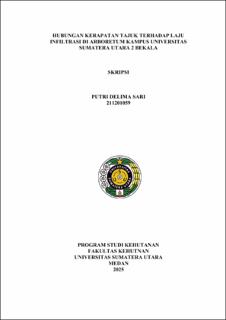Hubungan Kerapatan Tajuk terhadap Laju Infiltrasi di Arboretum Kampus Universitas Sumatera Utara 2 Bekala
Relationship between Canopy Density and Infiltration Rate in the Arboretum of the University of North Sumatra 2 Bekala Campus

Date
2025Author
Sari, Putri Delima
Advisor(s)
Anggraini, Novita
Slamet, Bejo
Metadata
Show full item recordAbstract
The level of canopy density affects the infiltration rate in the Arboretum of
the University of North Sumatra 2 Bekala Campus. Infiltration plays an important
role in maintaining the availability of groundwater and the sustainability of the
hydrological cycle. This study uses a purposive sampling method at four levels of
canopy density, namely very dense, dense, medium, and very low. The infiltration
measurement process was carried out using a double ring infiltrometer, then
analyzed using the Horton and Kostiakov model approach. The results of the
analysis showed that the area with medium canopy density produced the highest
average infiltration rate, which was 3.15 cm/hour, while the very dense canopy
showed the lowest value, which was 0.95 cm/hour. Based on validation tests using
the RMSE and NSE methods, the Horton model proved to be more accurate in
describing the infiltration rate than the Kostiakov model. In addition, factors such
as soil texture, water content, organic matter content, and soil mass density also
affect the soil's ability to absorb water. From this study, it was concluded that the
level of canopy density has a significant impact on the infiltration process, and
balanced canopy management plays an important role in supporting the soil's ability
to absorb water optimally.
Collections
- Undergraduate Theses [2183]
